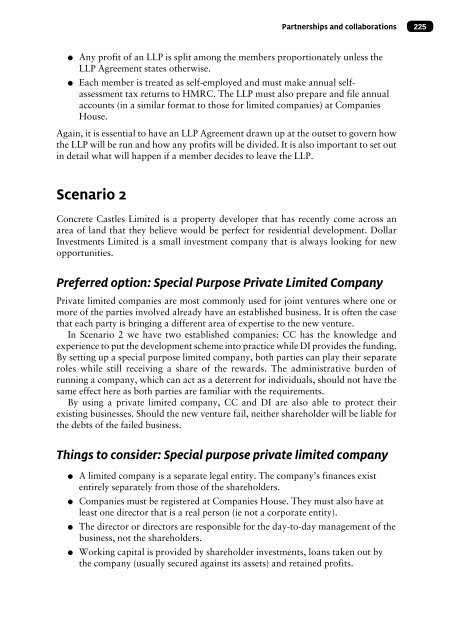The growing business handbook : inspiration and advice ... - Sparkler
The growing business handbook : inspiration and advice ... - Sparkler
The growing business handbook : inspiration and advice ... - Sparkler
You also want an ePaper? Increase the reach of your titles
YUMPU automatically turns print PDFs into web optimized ePapers that Google loves.
Partnerships <strong>and</strong> collaborations<br />
225<br />
●●<br />
●●<br />
Any profit of an LLP is split among the members proportionately unless the<br />
LLP Agreement states otherwise.<br />
Each member is treated as self-employed <strong>and</strong> must make annual selfassessment<br />
tax returns to HMRC. <strong>The</strong> LLP must also prepare <strong>and</strong> file annual<br />
accounts (in a similar format to those for limited companies) at Companies<br />
House.<br />
Again, it is essential to have an LLP Agreement drawn up at the outset to govern how<br />
the LLP will be run <strong>and</strong> how any profits will be divided. It is also important to set out<br />
in detail what will happen if a member decides to leave the LLP.<br />
Scenario 2<br />
Concrete Castles Limited is a property developer that has recently come across an<br />
area of l<strong>and</strong> that they believe would be perfect for residential development. Dollar<br />
Investments Limited is a small investment company that is always looking for new<br />
opportunities.<br />
Preferred option: Special Purpose Private Limited Company<br />
Private limited companies are most commonly used for joint ventures where one or<br />
more of the parties involved already have an established <strong>business</strong>. It is often the case<br />
that each party is bringing a different area of expertise to the new venture.<br />
In Scenario 2 we have two established companies: CC has the knowledge <strong>and</strong><br />
experience to put the development scheme into practice while DI provides the funding.<br />
By setting up a special purpose limited company, both parties can play their separate<br />
roles while still receiving a share of the rewards. <strong>The</strong> administrative burden of<br />
running a company, which can act as a deterrent for individuals, should not have the<br />
same effect here as both parties are familiar with the requirements.<br />
By using a private limited company, CC <strong>and</strong> DI are also able to protect their<br />
existing <strong>business</strong>es. Should the new venture fail, neither shareholder will be liable for<br />
the debts of the failed <strong>business</strong>.<br />
Things to consider: Special purpose private limited company<br />
●●<br />
●●<br />
●●<br />
●●<br />
A limited company is a separate legal entity. <strong>The</strong> company’s finances exist<br />
entirely separately from those of the shareholders.<br />
Companies must be registered at Companies House. <strong>The</strong>y must also have at<br />
least one director that is a real person (ie not a corporate entity).<br />
<strong>The</strong> director or directors are responsible for the day-to-day management of the<br />
<strong>business</strong>, not the shareholders.<br />
Working capital is provided by shareholder investments, loans taken out by<br />
the company (usually secured against its assets) <strong>and</strong> retained profits.








